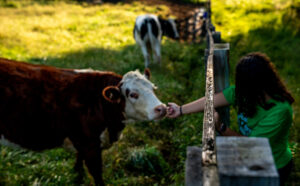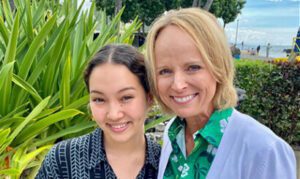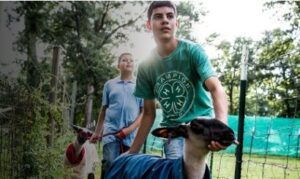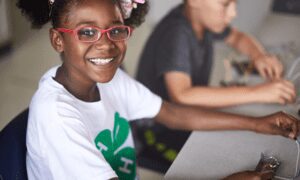National 4‑H Council is proud to honor 4‑H mentors who have changed the lives of youth in their communities by serving as role models, educators, life coaches and friends. Today we feature the Alabama 4‑H LIFE Mentoring Program at Alabama A&M University, serving Alabama’s Calhoun and Madison counties.
Since its development at Alabama Cooperative Extension in 2010, the 4‑H Living Interactive Family Education (4‑H LIFE) program addresses the needs of incarcerated youth and youth with incarcerated parents. Alabama A&M University was the first in the nation to use the 4‑H LIFE model in reverse working with incarcerated youth. This unique 4‑H Mentoring Program caters to three sites: an all-female facility, an all-male facility, and a male facility for incarcerated youth, ages 12-18. Each site has three key focuses:
- Weekly workshops to enhance the quality of life of the youth that we serve.
- Family reunification quarterly meetings to strengthen the family bond and to unite the youth and their parent/caregiver, ensuring the importance and value of families.
- Individual and group mentoring, utilizing E-mentoring as the primary method of mentoring using video conferencing, mentoring from a distance.
We spoke with Lakeisha Johnson, project site coordinator, who shared her insights on the 4‑H LIFE Program in Alabama and her experiences.
What are the goals of the Alabama 4‑H LIFE Mentoring Program?
Lakeisha Johnson (LJ): The overall goal is to instill knowledge and values in the life of the youth that we serve and to allow them to look into a new direction – a positive direction. We want to enhance their life and let them know that today is a new day and that it is up to you to make a difference and to make a change. Overall: to be an innovative force and a positive influence.
What areas do you focus on most when mentoring a young person? Academics, career path, personal growth, etc.?
LJ: I believe all of them. Specifically, life skills, education and career development. We also teach youth that they are their biggest champions. We want them to be great students and have a life plan. Additionally, we have a program called PREP, Promoting Readiness for Employment Possibilities, designed by Alabama Cooperative Extension System, Alabama A&M University. It focuses on components such as professional dress, resume building, and interview tips and skills.
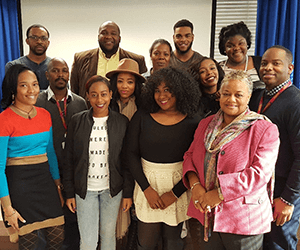
Today, in many cases, youth development organizations have become the main source of mentorship and learning for young people, other than school learning. What does it take for families to become actively involved in a child’s upbringing, both during and after school?
LJ: We all have people that we look up to so it is critical that parents and families remember that they have to be accountable and responsible for their actions and choices. You have to remember that you are responsible for these young people. I also think that educating families is critical and having resources that families can access. We have open discussions in our programs that help bridge the gap between youth and families. Our Family Reunification quarterly meetings and our newsletters are resources that we offer to youth and families.
Share with us your most rewarding experience(s) as a mentor.
LJ: In 2012, we worked with incarcerated young men and women at the Camp Louis Academy in Calhoun County. One young lady who was leaving that week was so emotional and thankful, and she told me that I made a difference in her life.
In another instance, there was a young man who was there for a quite a while. He said that when he graduates in May 2016 he wants to go to Alabama A&M and study electrical engineering. We mailed a university t-shirt to motivate him and remind him of his goal.
The students upon exiting the facility write a note regarding their overall experience with the Alabama 4‑H LIFE Mentoring Program. It shows me that the youth do listen, even when we think they are not.
Were you mentored as a young person? If so, who was your mentor and how did that person make a positive impact on your life?
LJ: I was mentored and served as a youth mentor growing up. My first mentors were my parents because they instilled the values, knowledge, and everything within me to be the best me that I can be. My Mom established the foundation and never allowed it to dwindle. My parents are a blessing and I truly value them for who they are and loving me unconditionally. I never had to worry; they always were there for me and pushed me. They taught me to treat people the way you want to be treated.
Outside of my parents, I had other great individuals to look up to including a social worker from school who was the director of a youth program that I was involved in. Later, I became a youth mentor during the summer for the same organization. I also volunteered at the hospital and worked on one of the most critical floors. It was something that I wanted to do to give back, not for a letter of recommendation or credit, but just because I was passionate.
In what ways do you think someone, at any age, can benefit from being a mentor?
LJ: I don’t think everyone is meant to be a mentor. However it takes a sense of commitment, accountability, responsibility and genuineness to become a great mentor. You never know who sees you as a role model. I think mentors are important, as they guide and show you new things about life, and want you to evolve and grow.
What advice would you give someone interested in becoming a mentor?
LJ: Know that if you participate in this opportunity you should be willing to share your experiences, advise and guide those individuals that you are mentoring; at the end of the day you are accountable for your actions. Never sweat the small stuff, embrace change, and be open to new ideas and new people. You never know how much you can learn and how that mentee can truly impact your life.









